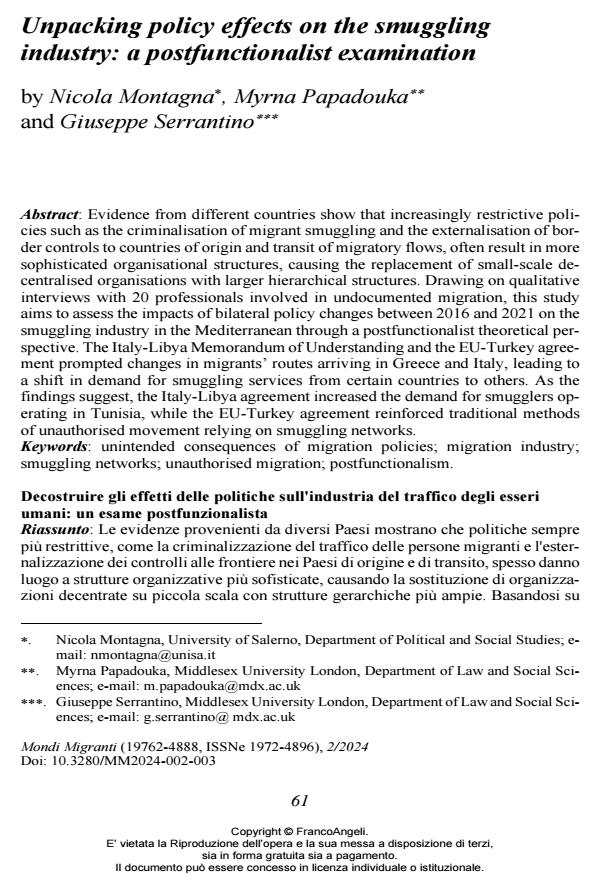Unpacking policy effects on the smuggling industry: a postfunctionalist examination
Titolo Rivista MONDI MIGRANTI
Autori/Curatori Nicola Montagna, Myrna Papadouka, ,Giuseppe Serrantino
Anno di pubblicazione 2024 Fascicolo 2024/2
Lingua Inglese Numero pagine 24 P. 61-84 Dimensione file 208 KB
DOI 10.3280/MM2024-002003
Il DOI è il codice a barre della proprietà intellettuale: per saperne di più
clicca qui
Qui sotto puoi vedere in anteprima la prima pagina di questo articolo.
Se questo articolo ti interessa, lo puoi acquistare (e scaricare in formato pdf) seguendo le facili indicazioni per acquistare il download credit. Acquista Download Credits per scaricare questo Articolo in formato PDF

FrancoAngeli è membro della Publishers International Linking Association, Inc (PILA), associazione indipendente e non profit per facilitare (attraverso i servizi tecnologici implementati da CrossRef.org) l’accesso degli studiosi ai contenuti digitali nelle pubblicazioni professionali e scientifiche.
Evidence from different countries show that increasingly restrictive policies such as the criminalisation of migrant smuggling and the externalisation of border controls to countries of origin and transit of migratory flows, often re-sult in more sophisticated organisational structures, causing the replacement of small-scale decentralised organisations with larger hierarchical structures. Drawing on qualitative interviews with 20 professionals involved in undocu-mented migration, this study aims to assess the impacts of bilateral policy changes between 2016 and 2021 on the smuggling industry in the Mediterra-nean through a postfunctionalist theoretical perspective. The Italy-Libya Memorandum of Understanding and the EU-Turkey agreement prompted changes in migrants’ routes arriving in Greece and Italy, leading to a shift in demand for smuggling services from certain countries to others. As the find-ings suggest, the Italy-Libya agreement increased the demand for smugglers operating in Tunisia, while the EU-Turkey agreement reinforced traditional methods of unauthorised movement relying on smuggling networks.
Le evidenze provenienti da diversi Paesi mostrano che politiche sempre più restrittive, come la criminalizzazione del traffico delle persone migranti e l'e-sternalizzazione dei controlli alle frontiere nei Paesi di origine e di transito, spesso danno luogo a strutture organizzative più sofisticate, causando la sosti-tuzione di organizzazioni decentrate su piccola scala con strutture gerarchiche più ampie. Basandosi su interviste qualitative a 22 professionisti che a vario titolo operano in relazione alla migrazione irregolare, questo studio si propone di valutare gli impatti dei cambiamenti delle politiche bilaterali tra il 2016 e il 2021 sull’industria del traffico delle persone migranti nel Mediterraneo attra-verso una prospettiva teorica postfunzionalista. Il Memorandum d’intesa Ita-lia-Libia e l’accordo UE-Turchia hanno provocato cambiamenti nelle rotte dei migranti che arrivano in Grecia e in Italia, portando a uno spostamento della domanda di servizi di facilitazione della migrazione irregolare da alcuni Paesi ad altri. Come suggeriscono i risultati, l’accordo Italia-Libia ha aumentato la domanda di trafficanti che operano in Tunisia, mentre l’accordo UE-Turchia ha rafforzato i metodi tradizionali di movimento non autorizzato che si affida-no alle reti del traffico.
Parole chiave:conseguenze involontarie delle politiche migratorie; industria migratoria; reti di contrabbando; migrazione non autorizzata; postfunzionali-smo.
Nicola Montagna, Myrna Papadouka, ,Giuseppe Serrantino, Unpacking policy effects on the smuggling industry: a postfunctionalist examination in "MONDI MIGRANTI" 2/2024, pp 61-84, DOI: 10.3280/MM2024-002003